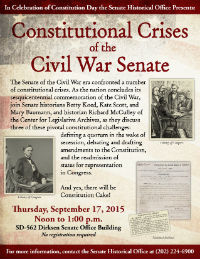
More than two centuries after its ratification, the United States Constitution remains a fundamental document. Strengthened by amendments, it continues to guide our public officials and the people they serve. It has endured through civil war, economic depressions, assassinations, and even terrorist attacks, and remains a source of wisdom and inspiration. To encourage Americans to learn more about the Constitution, Congress established Constitution Week in 1956, to begin each year on September 17—the date in 1787 when delegates to the federal convention signed the Constitution. In 2004 Senator Robert C. Byrd of West Virginia took it a step further, sponsoring legislation designating September 17 of each year as Constitution Day and requiring public schools and government offices to provide educational programs to promote a better understanding of the Constitution.
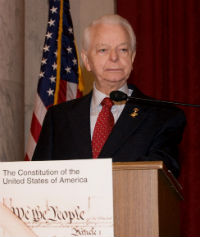
Appropriately, Senator Byrd kicked off the Senate's first Constitution Day celebration in 2005 with a speech in the historic Caucus Room in the Russell Senate Office Building. He shared his personal devotion to the Constitution (a copy of which he always kept in his pocket) and stressed the importance of educating Americans about their founding document. "Just as the birth of our nation depended on the quality, knowledge, and experience of the men who gave it life, its continued vitality depends on the efforts of our generation, and of future generations, to keep the vision of its Framers alive," Byrd stated. "It depends on the personal commitment of each and every one of us to learn, to understand, and to preserve the governing principles that are set forth so clearly and powerfully in the text of our remarkable Constitution."
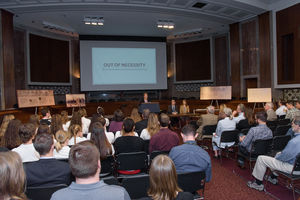
For the Senate Historical Office, Constitution Day has been an opportunity to explore the ways in which the Constitution has shaped the Senate, the role of the Senate in amending the Constitution, and how the Senate has exercised its constitutional prerogatives and fulfilled its constitutional duties. The annual event has examined the debates of the federal convention in 1787 that led to the creation of the Constitution, the heated arguments of the state ratification process, as well as the nature of federal elections under the Constitution and how Congress has changed the electoral process over time.
These events also have examined how the Constitution has been amended, from the adoption of the Bill of Rights in 1791 to the passage of the Seventeenth Amendment providing for the direct election of U.S. senators in 1913 and the Nineteenth Amendment providing for female suffrage in 1920. Other topics have included the Senate's constitutional role in the treaty-making process and the various constitutional crises confronted by the Civil War Senate, including defining a quorum in the wake of secession, Civil War amendments to the Constitution, and the readmission of states to representation after the war.
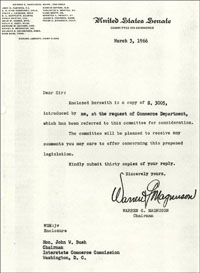
In recent years, Constitution Day programs have expanded to include guided exhibits featuring facsimiles of historic documents, maps, and images. In 2016, to commemorate the 200th anniversary of the creation of the Senate’s first permanent standing committees in 1816, Senate historians and archivists created four archival exhibits that demonstrated how committees aid the Senate in exercising its powers under the Constitution. Highlighting the work of four committees established in 1816 (Foreign Relations, Finance, Judiciary, and Commerce), these exhibits illustrated how Senate committees provide a forum for constitutional government in action.
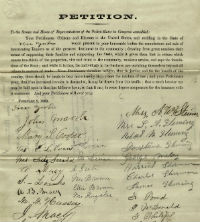
Using case studies from different eras, the documents revealed how Senate committee work has changed since 1816 and highlighted the growing role of committee staff. In the 20th century, as the nation grew to superpower status, the Senate reformed and modernized its committee structure, allowing for increased professional staff who brought their expertise to the legislative and oversight process. For the many staff members attending the event, this served as a reminder of the vital role they play in Senate history and the continuing importance of archiving committee records.
In 2017 the Senate’s Constitution Day event focused on the contentious debate during the Constitutional Convention of 1787 over representation that culminated in the Great Compromise of 1787, the agreement that established state equality rather than population-based representation as a defining characteristic of the Senate. Following a brief historical presentation, those attending the event explored archival exhibits illustrating the debate that produced this compromise, how the compromise was received during the ratification process, and its enduring legacy.
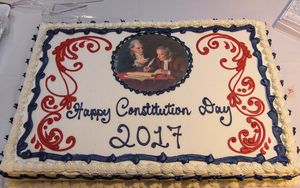
Constitution Day 2018 examined how the constitutional provision for equal state representation in the Senate led to fierce battles over the admission of new states. Article IV of the Constitution specifies that "New States may be admitted by the Congress into this Union." The Constitution also gave Congress the power "to dispose of and make all needful Rules and Regulations respecting the Territory . . . belonging to the United States." The Constitution, the 1787 Northwest Ordinance, and later treaties under which the U.S. acquired new territories—such as the Louisiana Purchase Treaty of 1803—governed Congress's practices for organizing territories and setting conditions for statehood.
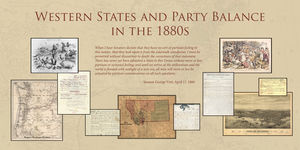
Only after territories had served a period of tutelage and built up the requisite population and economic resources could they apply to Congress for equal status as a state. As Assistant Historian Daniel Holt explained in his Constitution Day 2018 presentation, the Senate frequently “took center stage in the often-contentious battles over admission of new states. Each additional state has held the potential to upset the existing balance of power in the Senate." To accompany this event, the Historical Office created an online feature entitled "On Equal Footing: The Constitution, the Senate, and the Expanding United States," which included historical information and the archival exhibits from this presentation.
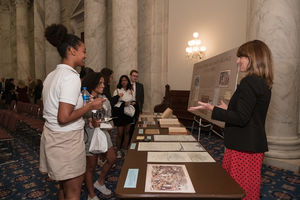
The Constitution of 1787 established the framework for the United States government, but it has fallen to succeeding generations to interpret and implement its principles. Every year, Constitution Day provides the opportunity for citizens to revisit the nation’s founding document and examine how it shapes this nation more than two centuries after its ratification. The Senate Historical Office welcomes this annual opportunity to continue its explorations into the origins of the Constitution and its role in the history of the United States Senate.